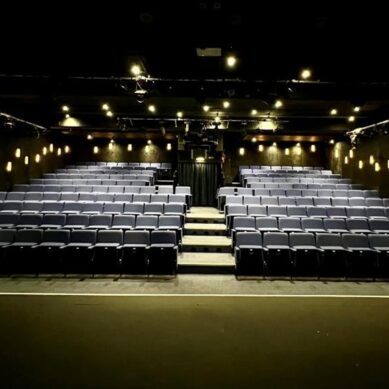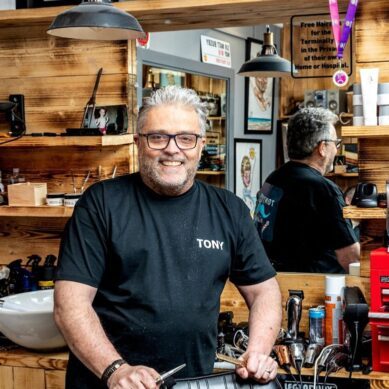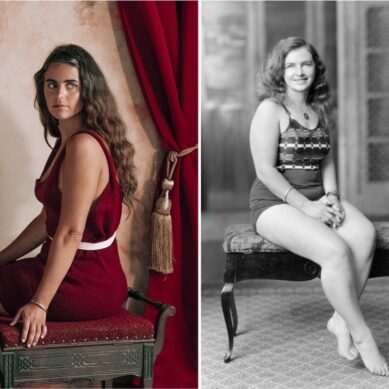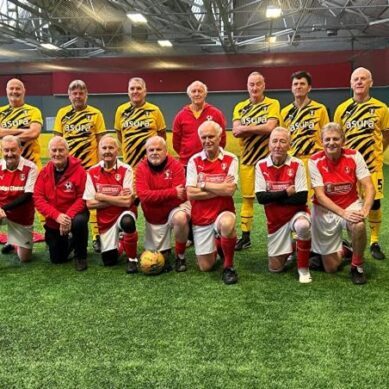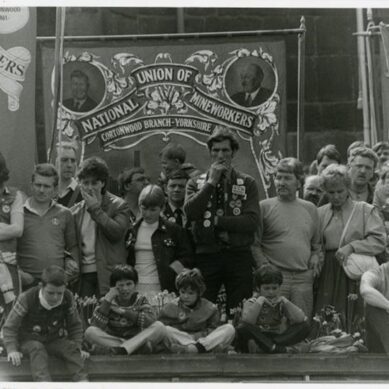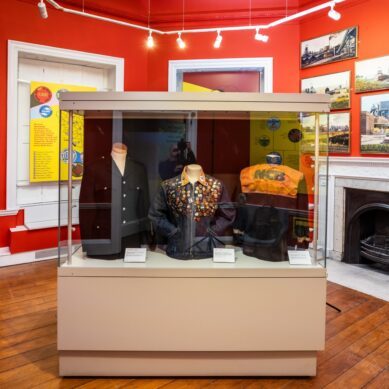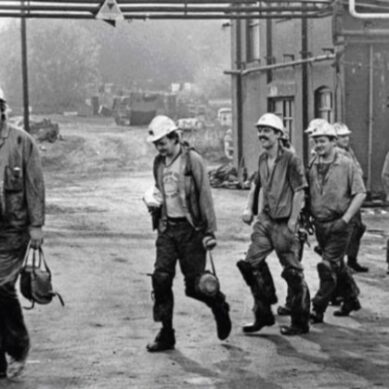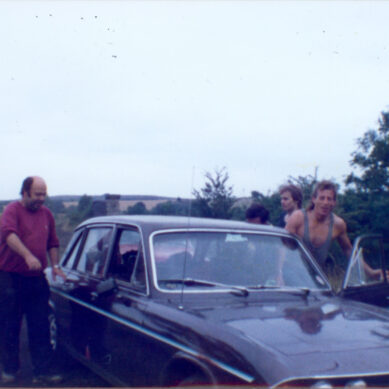They say laughter is the best medicine, but for Dr Steve Burns a good dose of ‘glass half full’ attitude has been the secret to his continued concern for the people of Rotherham.
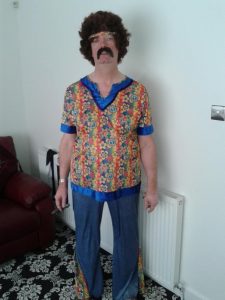 One of the main questions a doctor asks you at a health check up is how many units of alcohol do you drink on average in a week. Yet every part of Steve’s life works its way back to the bottom of a glass.
One of the main questions a doctor asks you at a health check up is how many units of alcohol do you drink on average in a week. Yet every part of Steve’s life works its way back to the bottom of a glass.
From becoming a GP, to his involvement in the launch of Rotherham Hospice, and even being awarded an MBE – all have beverage-based beginnings.
Like a good public house, Steve’s qualities can be likened to the complexity of what’s on the bar.
A strong stout member of the community with a robust lust for life, yet mellow and easy going. Popular and well balanced, distinctive and pioneering. With an extra sprinkling of science for the strength to survive the journey.
Some may recognise him as the familiar face of Rotherham Real Ale and Music Festival. Others may have spotted him raising a glass to charities in Rotherham through his work with the Round Table. And others will have been seen by him at his GP surgery, having been a partner at Stag Medical Centre for 30 years.
Although now an accustomed Rotherhamer, Steve’s roots lie in the North East, having moved to South Yorkshire as a student.
Tyne for a change
Born in Newcastle to his teacher mother and RAF squadron leader-come-Methodist minister father, Steve’s upbringing gave him a sense of duty and care from a young age. Yet he didn’t consider a career in medicine until applying for university.
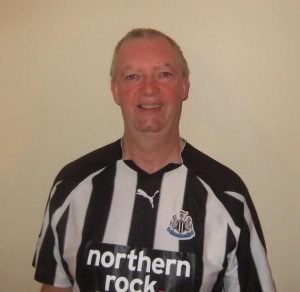
Come on the Toon!
A high achiever, Steve attended Royal Grammar School in Jesmond, a well-respected school in the North East. As an Old Novo, it was always presumed he’d progress to university, their motto of ‘By learning you will lead’ testimony to the success of their alumni. But Steve never really knew what he wanted to do on leaving school.
“I remember filling in a university application one lesson and my Biology teacher was also my personal tutor. I didn’t have a clue about what course to study and he asked if I’d ever thought about becoming a doctor.
“I said why would I want to do that? There were no previous doctors in my family but I had always enjoyed my science studies. He said because there’s zero chance of unemployment, it would be a job for life, and the money is good so I thought why not,” Steve says.
Like most mothers, Steve’s mum wanted her boy to stay close to home and study at Newcastle University but Steve had other ideas.
“I wanted to move away, far enough so that my parents didn’t expect me to come home every weekend but close enough so that I could if I wanted to. I looked at the next big county – Yorkshire. Leeds and Sheffield were two big student cities but Sheffield had two football teams so that city won.”
Steve moved to Sheffield aged 17 and has remained in South Yorkshire ever since.
Starting his GP career
During his initial five-year Bachelor degree at Sheffield Medical School, Steve built up a great reputation as a student doctor and was lucky to be one of the last cohorts of students to train at the city’s Royal Infirmary and Royal Hospital.
“I never liked the idea of working in a high-rise hospital and was grateful that I’d graduated just before the Hallamshire opened in the late 70s. I enjoyed the breath of fresh air we could take between visits at the Royals – I hated being cooped up.”
It was from this that Steve knew he wanted to work out in the community as a General Practitioner.
Next came four years post-graduate training to achieve his qualification as a GP where he worked in hospitals and surgeries across South Yorkshire. Here, he met his wife Janet who was a sister at Barnsley Hospital.
“I stepped onto the ward for my very first shift and was greeted by a senior sister. She said to me, ‘are you married?’ No. ‘Are you courting?’ No. ‘Then you should take Sister Janet out.’”
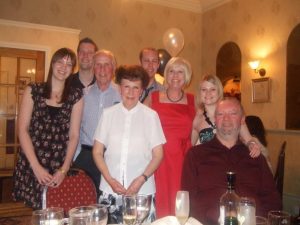
Celebrating their 30th anniversary
He finally plucked up the courage to ask her out one social staff gathering over a pint. The couple married six months later and went on to have three children.
In 1982 aged 26, Steve qualified as a GP and quickly gained his first job – a hoppy feat.
Outside of his studies he played rugby with other Sheffield medics. One Saturday afternoon in December, their match against Birmingham Old Boys was called off due to the snow.
So what could 15 rugby lads do now?
They went drinking, of course, spending seven hours in the Hallamshire doctors’ mess.
“My friend Ted Daly played with us and he was asking what my plans were now I’d finished my training. I mentioned I wanted to get into a GP surgery. I thought he went to the toilet but he came back and said his father would interview me on Wednesday.”
Ted’s dad Frank was a partner at Stag Medical Centre and offered Steve the job straight away. He became the youngest GP in Rotherham at the time, going on to become a partner after six months.
If the game hadn’t been called off and he didn’t like a pint, who knows which way his life would have panned out.
The Golden Age of General Practice
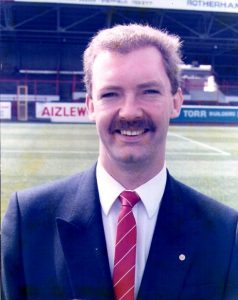
As a young doctor
Steve started his career in the golden age of general practice. It was back to the days when all the doctors in the area were like a big team. They studied together, had hobbies together, their children played together and they all learned from one another.
With a high ratio of patients to doctors in Rotherham, it helped that they weren’t in competition with each other.
“It was a lovely atmosphere back then. I could do my morning visits in the community, go home for lunch to see the kids or visit patients in hospital, and be back for the afternoon surgery.”
Patients became familiar and friendly, calling him Steve rather than Dr Burns. Children who came with sulky faces would leave in glee armed with a ‘brave for the doctor’ sticker. He’d never tire of seeing his patients, even if just to chat to the lady who lived round the corner and see how her acute ailment was getting on. Every once in a while he’d even retrieve his stethoscope from the boot of his car to examine a friend. The doctor coat never came off.
Today, doctors and nurses are swimming in a bottomless pile of paperwork, tackling unsociably long shifts with the mounting pressure of NHS destruction and patient complaints.
However, for Steve, he found complete job satisfaction during his long serving career, relishing in the simplicity of conversation and patient interaction.
While he was on call, patients would phone his landline and Janet would take calls for him. Most knew she was a nurse so they’d ask for her advice if Steve wasn’t in.
“This was a time before mobiles so if I was out, I’d have to search for a phone box or use patients’ house phones to ring home and check if anyone had called needing an urgent visit.”
Although now retired from the Stag surgery, he still works two days as a Locum Doctor and also teaches medical students at Sheffield University, lecturing on modules such as the dangers of alcohol – of all things.
“I always tell my students it’s the best job in the world and I wouldn’t have done things differently. We might not cure people as GPs, but we make a difference every day that helps or benefits others.”
Services to health care
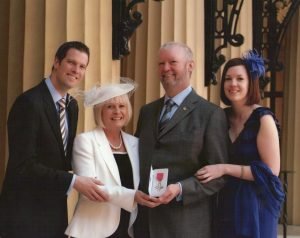
Receiving his MBE
Due to his undivided support, it was a patient’s wife who put him forward for an MBE back in 2011. Steve cared for her husband when he was dying and gave them his personal number to call him whatever time of day if anything happened.
The call sadly came at 2am one morning and Steve made his way over to the family home to console his wife and daughter in the early hours.
“They were so grateful and said I deserved a medal. But I was just doing my job.”
The lady went to visit Janet to discuss the idea of nominating Steve for the award which surprised him when the letter arrived in the post inviting him to the ceremony in 2012.
“It was Prince Charles who awarded me the MBE for services to healthcare and the community and I thought he’d ask me about my career and charitable works so prepared all my answers. But he actually said to me, ‘I hear you like real ale, do you have any good breweries in Rotherham?’”
A need for a hospice in Rotherham
Alongside his career, Steve has also practised in philanthropy, wanting to give back to the community in other ways.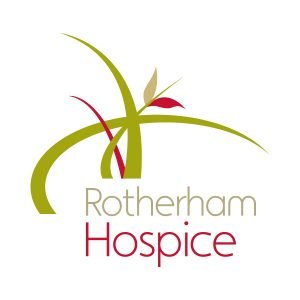
During the late 80s, Steve was one of the 13 people who originally founded Rotherham Hospice.
He used to go drinking with Dr Brendan Hudson and they often discussed the need for a hospice in Rotherham.
“The closest was St Luke’s in Sheffield and by the time Matron had been out to assess a patient, a bed had become available and they were taken there, it was often too late.”
At this time, cars weren’t as prevalent on the roads as today and so many relied on public transport. But it would take someone from Rotherham three buses to get to St Luke’s to visit a loved one in the hospice.
The chat over a pint was around the same time that Gerald Shaw gave Rotherham Hospital’s chaplain, Ralph Weston, £5 towards helping people dying from cancer. His wife had passed away from cancer in the hospital and he felt the busy ward wasn’t the end of life she deserved.
From this, the campaign was started to launch a hospice in Rotherham, with Steve one of the 13 people who attended the first meeting in 1988. Ralph became Chairman with Steve volunteering to be chairman of the fundraising committee.
They hosted sponsored walks, coffee mornings and family events in order to raise an initial £2,000 to launch the trust.
“I met the leader of the council at the time, Cllr Jack Laden, to enquire about using Bailey House. We’d invited about 200 people from the council, health authority and local media.
Jack said it would be £10 per head so 200 people, £2,000 – the amount we’d raised to start the trust. I was a little disappointed we’d have to spend all our hard earned money but he then gave me a piece of paper and said to write him a letter asking for a £2,000 grant for the event, which he immediately agreed to.”
The meeting went ahead and a board of trustees and directors was formed to start The Rotherham Hospice Trust.
Unlike other hospices, they chose not to name it after a Saint so as not to be exclusive to just one faith. It was also to be used by anyone needing palliative care, not just cancer patients.
Steve got stuck in with the fundraising efforts having set a target of £1million to open the hospice. By 1993 they’d raised over half of that figure and opened a day hospice within the hospital grounds before purchasing the council’s old nurseries on Broom Road for a negligible amount.
“The site ticked all the boxes: it was on a main road; it was close to the hospice; and it had views of the countryside – or the playing fields at least.”
The hospice opened in 1996 and Steve applied to work there straight away, becoming one of the four doctors who took it in turns to work there in the week.
Back then, around half of all patients went home, the hospice being predominantly nurse run and more care based. There were no medical interventions, no drips, monitoring or bleeping machines, and most patients came for respite rather than end of life care.
His greatest achievement
Along with being pivotal in creating a hospice in Rotherham, Steve says one his proudest achievements is redefining mental health services for the town. Under the provision of RDASH, the local healthcare trust, patients needing mental health support often had up to a six month wait to be seen by a mental health professional.
With the help of two mental health nurses, Julie Hunter and Sue Schmitz-Butler, Steve took over the service through the Primary Care Trust to give each GP practice in Rotherham access to a mental health nurse, a psychology graduate worker and a counsellor which became the best thing to happen for the service in decades.
Boy Scouts with beer
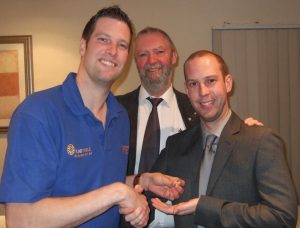
Steve and his two sons
To help even more people in Rotherham, Steve also joined his local Round Table club as a young doctor and has been part of it for over 30 years. The Burns family have had three Round Table chairmen, with Steve’s two sons following in his footsteps.
Known as boy scouts with beer, the Round Table don’t just sit there talking – they get out in the field to actually make a difference to local people. While part of the group, Steve has done everything from creating a garden at Newman School to decorating an old gentleman’s home in Herringthorpe.
For 33 years, he has joined the Round Table on their annual Santa sleigh visits around the local area and last Christmas they raised £7,000 through donations over the ten nights. He’s even played the Santa role.
“One year a little bird, her father, told me that a young girl called Sarah wanted a painter’s set for Christmas and he’d search across the county to finally get one. I spotted her in the crowd with her mum and told her I, or Santa, was bringing her a painter’s set.
“Her dad was so pleased, he brought me a bottle of whisky round as he said it was the happiest he’d seen Sarah and his wife in years.”
By keeping all money raised local, the fundraising efforts from the Round Table has gone to numerous worthy causes from the local foodbanks to Rotherham Cancer Care and the Talking Newspaper.
“The hardest part is deciding who to give the money to. For some charities, what we donate is a drop in the ocean for them, while for others it’s a lifeline. Services such as the foodbank can help a lot of people with our donation. We want to make a bigger difference to people we know will appreciate our help and we’re always looking for deserving causes for the future.”
Mr Real Ale
And of course, we can’t talk about Steve Burns without mentioning the beer festival.
If you haven’t already gathered, Steve has always enjoyed beer in moderation and joined CAMRA 12 years ago after spotting a leaflet while out with friends in Sheffield.
“It said – ‘do you want to be a beer warrior?’ Damn straight I did.
Two weeks after I joined there was an AGM in Rotherham and, of course, I can’t go to things and not get involved so I volunteered with my friend Geoff Brown as joint fundraisers on the committee.”
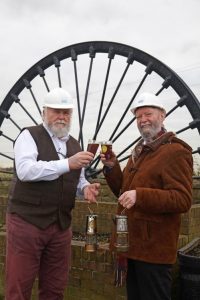 One of the big events on the beer scene in Rotherham is the Real Ale and Music Festival which was then held at Oakwood School. Steve and Geoff ran the tombola and Janet took over the catering.
One of the big events on the beer scene in Rotherham is the Real Ale and Music Festival which was then held at Oakwood School. Steve and Geoff ran the tombola and Janet took over the catering.
After 19 years at Oakwood, it moved to Magna in 2011 which Jim Charters, the then lead organiser, said would be his last event. With a life motto of ‘I’ll do it’, Steve took over as organiser with the first night at Magna being his first night in charge, helped by joint organiser for the music, John Hyslop.
Since then, Steve and John have continued to help the beer festival grow by moving with the times and enticing a wider audience with things like Prosecco cocktails, craft beer and a variety of music genres.
Since the move to Magna, the beer festival has raised over £120,000 for various charities including Rotherham Hospice, Bluebell Wood and Weston Park Cancer Charity.
“Whenever John and I put on events, whatever it may be, we always do it for three reasons. One – to have a good time; two – to raise the profile of the charity; and three – to raise money.”
Steve has since gone on to chair the local CAMRA branch, along with being a trustee at Maples Cancer Care Centre and secretary of Rotherham BMA.
With such a busy schedule, it’s surprising how he manages to fit it all in while also spending time with his two grandsons or going to St James’ Park to watch his beloved Magpies.
“One thing I’ve learnt after listening to patients over the last 30 years is that people always regret the things they didn’t do. We never know what will happen tomorrow and I want to enjoy myself and say yes to anything – within reason.”
